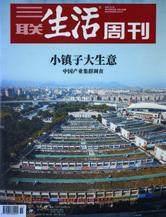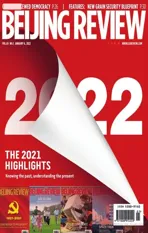NEW XINJIANG PARTY CHIEF
2022-04-13
NEW XINJIANG PARTY CHIEF
Ma Xingrui, former Governor of Guangdong Province, was appointed secretary of the Communist Party of China Committee of Xinjiang Uygur Autonomous Region on December 25, 2021.
Born in 1959, Ma earned his PhD in 1988, specializing in flight dynamics at the Harbin Institute of Technology (HIT), and in 1993 became the dean of the institutes Department of Aerospace Engineering and Mechanics, before being named HITs vice president in 1996.
From 1996 to 2012, he held several senior positions at the China Academy of Space Technology and China Aerospace Science and Technology Corp.
In 2013, Ma was appointed vice minister of industry and information technology, head of the China National Space Administration and director of the China Atomic Energy Authority before launching his political career in Guangdong.
That same year, he became deputy Party chief of Guangdong and went on to become provincial governor in 2017.
Road to Common Prosperity
Peoples Daily December 24, 2021
Road networks across the vast rural areas, much like capillaries, cater to the immediate demands of villagers if they want to venture beyond town borders. The byroads along National Road 214 are all well-made and maintained. In some sections, the creation of tunnels helps reduce travel time from one hour to 10 minutes. Especially when it comes to crossing the Lancang River, dangerous zip treks have been replaced by solid and sophisticated bridges. Experiencing the upgrade from mud roads to gravel, cement and asphalt roads, locals today find traveling increasingly convenient, in turn ensuring smooth business flows between mountainous areas and the rest of the country.
The establishment of advanced transportation networks, especially of roads leading into the countryside, is a prerequisite for developing the rural economy and for people there to benefit from the countrys overall development.
Small Towns, Big Hopes
Lifeweek December 25, 2021

On Chinas national economic map, small towns possess traits of both rural and urban areas. Towns thus naturally become the breakthrough areas for the solving of problems concerning farmers, agriculture and the general countryside. The township economy used to contribute one third of the countrys economic growth in the 1980s, even well into the 1990s, but it began shrinking continuously since the mid-1990s due to various reasons. Yet as the Chinese economy enters a new era of development, it once again is becoming a prominent feature in the Chinese economic landscape, particularly in the context of the countrys dual circulation growth paradigm, in which domestic and overseas markets reinforce each other, with the domestic market as the mainstay.
Today, the Internet brings new hopes to rural areas, with a coverage of 60 percent and 300 million users there. The popularization of all that is digital provides townships with various newfangled options.
E-commerce is proving extremely popular across the vast countryside. As of 2021, China had more than 7,000 Taobao villages, villages that generate 10 million yuan ($1.6 million) or more in e-commerce sales annually and have 100 or more active online shops on Taobao operated by residents, and their number is growing at an annual rate of 20 percent.
The townships, with their wide-ranging land and labor resources, now bear huge potential for economic take-off in the near future, bringing closer conclusive solutions to the underlying problems at play in agriculture and the countryside by large.
More and Younger Incentives
Guangming Daily December 27, 2021
Young experts in science and technology tend to be among the most active across all sectors.
Current assessment systems overemphasize the number of theses, and forego adequate measures for innovation, creativity and actual contributions to society. A rational academic assessment system must be able to steer young talents attention and energy toward key research that might lead to breakthroughs, so that they can make full use of their professional prime to create and innovate.
Another factor that dampens young scholars enthusiasm for research is their mismatched welfare and related management. Crucial scientific breakthroughs are based on continuous input, both difficult and exhausting, but those involved, and mostly the junior ones, often miss out on due awards and incentives.
The country now needs a talent management mechanism focusing on individual academic capability, performance and contributions, and select leading young science and technology talents. A stable mechanism to support the growth of young experts is crucial for them to develop quickly into academic backbones and leading figures.
TAIWAN ACTRESS SHOWS MAINLAND ID
On December 24, 2021, Taiwan-born actress and TV host Fang Fang posted a short video to show her brand new mainland ID card on Douyin, Chinas version of TikTok, receiving a warm welcome from mainland netizens on social media.
According to the actress, in late November, she applied for the mainland ID card, which provides convenience for Taiwan compatriots to study, work and live in the mainland.
“I did not expect it to be so easy and the process to be so convenient. You only need to bring your Taiwan Compatriot Permit, residential permit and a certificate of property or rental contract, and have your photo taken. The process takes less than 10 minutes,” Fang said in the video.
Fang, whose real name is Zhou Zhengfang, told followers she had been living in the mainland for the past 18 months. She often shares snippets of her daily life with her following, saying she came to the mainland very early and first got invested in Shanghai back in 2003.
“Our partnership with China is one that is mutually beneficial, based on win-win; we are very grateful to the Chinese Government and people for the support that they continue to render not only to our country, but to the rest of Africa.”
Kenyan President Uhuru Kenyatta, during an inspection tour of an expressway in Nairobi which is being constructed by a Chinese company, on December 23, 2021
“Since the reestablishment of diplomatic relations between our countries under the one-China principle, we have received different expressions of appreciation, affection and love for our people.”
Nicaraguan Presidential Advisor Laureano Ortega Murillo, in an interview with Xinhua News Agency after Nicaragua received a new batch of COVID-19 vaccines donated by China on December 24, 2021
“The competition between the U.S. and China is not a ‘modern boxing match and should be a ‘racing match; it should not be perceived or presumed as beating the other to the ground.”
Qin Gang, Chinese Ambassador to the U.S., during a recent joint interview with major American media outlets
“The fact is that Xinjiang prohibits any form of ethnic discrimination and forced labor. The peoples will is respected and their rights are protected by law.”
Xu Guixiang, spokesperson for the government of Xinjiang Uygur Autonomous Region, at a news conference in Beijing on December 25, 2021
